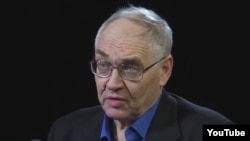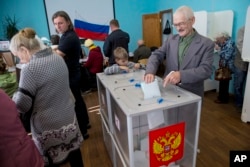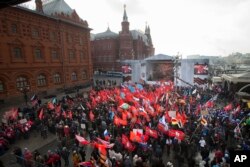Russian officials are using harsh new legal interpretations to silence nonprofit organizations whose work challenges government positions or authority, the director of the country’s only independent polling agency contends.
"The authorities have wanted to destroy the Levada Center as a large independent research organization for a long time," Lev Gudkov said in an interview this week with VOA’s Russian service.
The Russian Justice Ministry announced Monday it was designating the Levada Center as a "foreign agent," saying it had found irregularities in the organization’s paperwork during a snap inspection. In July, the pro-Kremlin Anti-Maidan movement had called on the ministry to investigate the center for failing to register as a foreign agent.
Russian authorities have used a 2012 law on "foreign agents" to blacklist groups receiving international funding and engaging in activities deemed political. Since 2014, the Justice Ministry had applied that designation to roughly 140 groups, with at least 22 closing as of last month, Human Rights Watch reported. It said the latter have included the Association of NGOs in Defense of Voters’ Rights, the Moscow School of Civic Education, the Freedom of Information Foundation and JURIX (Lawyers for Constitutional Rights and Freedoms).
The ministry’s announcement on the Levada Center came several days after the center published poll results showing support for the ruling United Russia party had dropped from 39 percent in July to 31 percent in August, The Moscow Times reported. Russian parliamentary elections are scheduled for September 18.
The U.S. State Department and the European Commission have condemned the ministry’s decision on the Levada Center.
"The action taken against the Levada Center is unwarranted, given [its] function, but more broadly we’re concerned about the scope of a law that seems to put at risk NGOs and other democratically minded civic organizations within Russia," State Department spokesman Mark Toner said at a press briefing Tuesday.
Gudkov offered more perspective in his interview with VOA.
Q: How do you explain that your organization has been added to the list of foreign agents now?
A: The authorities have wanted to destroy the Levada Center as a large independent research organization for a long time. Many attempts were made in this direction. We were audited in 2013 and 2014, but the wording of the law at that time did not allow [the center to be closed], because the law on nonprofit organizations – and that is precisely our status – prohibited receiving grants, but allowed commercial activity – that is, working on the basis of contracts with different research centers and companies.
This year, however, there have been very serious legislative changes in the interpretation of the terms "nonprofit organization" and "political activities."
Political activity is now being construed extremely widely and includes, among other things, conducting sociological surveys and even speaking at scientific seminars. ...
In short, it is not too difficult now to add virtually any public organization to the ranks of those involved in political activities. That, in itself, is relatively harmless, but under the conditions of receiving foreign funding, "engaging in politics" becomes a pretext for inclusion on the list of foreign agents.
We partner with many foreign universities, including in the United States. And this is becoming a source of persecution. So, the attacks on our center began at the beginning of the summer, in connection with the appeal [to the Justice Ministry] by Anti-Maidan, an organization which uses jingoistic and anti-Western slogans. The Anti-Maidan activists demanded that we be included on the registry [of foreign agents], as an organization which all but conducts intelligence activities under the control of the American intelligence services. That is the main reason.
However, the indirect catalyst for the [Justice Ministry’s snap inspection] was that one of our recent polls registered a drop in the popularity of the [ruling] United Russia party.
Q: The Financial Times suggested it was precisely this poll that sealed your fate.
A: I would not link them so directly … but, generally speaking, there is a tendency toward the intensification of a repressive domestic policy that is also encroaching on other public organizations and research centers. We are now number 141 on the list [of foreign agents].
Q: Is that an indication of the scale of the campaign against NGOs?
A: Yes, and I think that the list of "agents" will only grow. ...
Q: Konstantin Kosachev [head of the foreign affairs committee of the Federation Council, the upper chamber of Russia’s parliament] has publicly stated that the Justice Ministry’s decision regarding the Levada Center is in the interests of Russian society.
A: It is only in the interests of the power bloc [the security services and military-ED], the conservative-minded. I don’t see any demand on the part of the public for our destruction. Our findings get some attention, especially among the educated public that participates in public events. But there is a politically motivated push [to close the Levada Center]. And the current era in Russia is one of political reaction and backsliding to totalitarianism. So it's a much broader trend.
Q: Is the "persecution" of your organization and NGOs in general part of an attempt to clear the decks before the presidential election in 2018?
A: No, this is a reaction to the mass protests of 2012. The government fears a repetition in Russia of the Ukrainian Maidan [the protests that led to the ouster of Ukraine’s Russia backed president, Viktor Yanukovych]. The current leadership of the country has a paranoia – brought on, of course, by its own lack of legitimacy – that the economic crisis, the decline in living standards, will sooner or later provoke mass discontent, and that it is necessary, as a preventive measure, to destroy any sources of influence, independent organizations, opposition and so on. The more primitive a society is, the easier it is to manipulate and control it.
Q: So what do you plan to do now?
A: We will try to challenge the Justice Ministry’s decision, and then we will go to court. But given the dependence of our courts on the [presidential] administration, I don’t harbor any illusions. It's hard for me to predict. We’ll try any way we can to stay afloat. But, in reality, our death will be long and painful. We will constantly be forced to curtail our social research and, whenever possible, continue with commercial marketing research.






